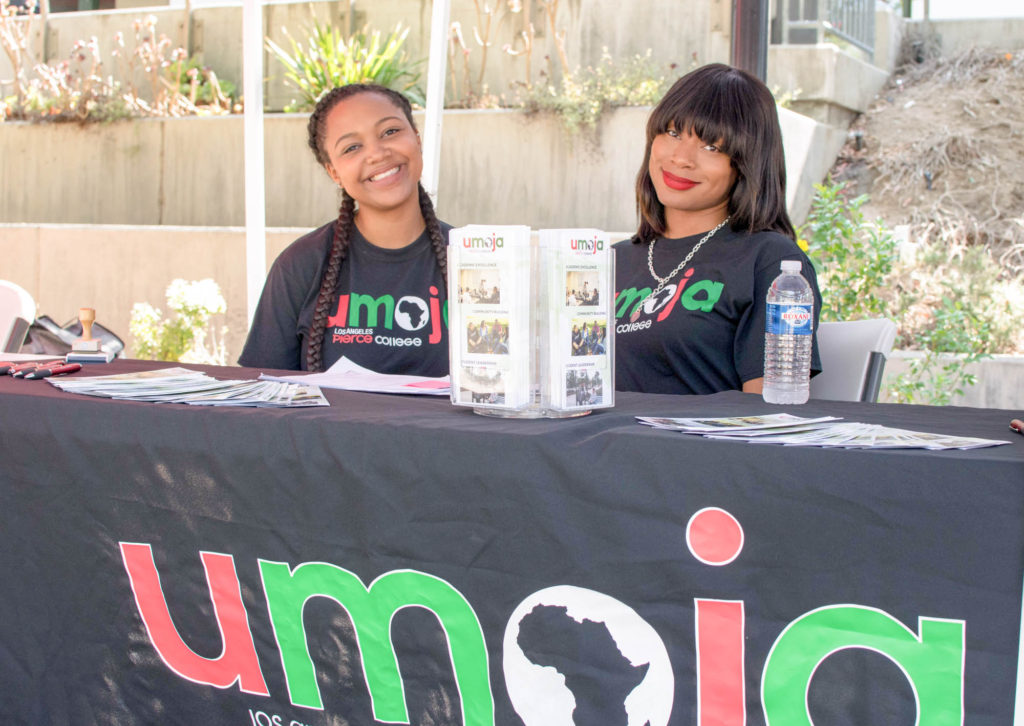
Due to the nature of community college, students often come and go, and are not always given the opportunity to form connections.
Umoja, the Swahili word for unity, is also the name of one of Pierce College’s newest programs, which incorporates village life to unify students by teaching history and culture.
UMOJA is a student support program that encourages African American students and others to learn about the culture, encouraging service and teaching leadership skills. The program, set up by UMOJA counselors Melody Smith and Lakashia Nelson, is inspired by traditional African villages.
UMOJA students participate in a year-long program, taking classes taught by specifically trained instructors. Learning courses are linked together so students can make connections between different subjects. Faculty collaborate to create common themes, projects and assignments.
“There’s a lot of benefits to the program, including a learning community with set classes throughout the year. Classes include English, African American history, sociology and math,” Smith said. “There is also mandatory counseling.”
According to Smith, the goal of the program is to create community relationships among the students, professors, mentors and counselors.
UMOJA was started in 2006 by college faculty to help at-risk, educationally and economically disadvantaged students build a foundation for success. The program receives $2.5 million in funding from California and is active on 46 California community colleges. It’s also partnered with the California State University (CSU) and University of California (UC) systems, where many UMOJA programs students plan to transfer.
Different services are offered by UMOJA, such as academic, career and personal counseling, local field trips to UC and CSU campuses, cultural events, mentoring, guest speakers, textbook rental assistance and student success workshops. Fully paid trips to historically black colleges and universities are offered twice a year, the first one being in October.
Ladell Chapple, a business major, joined UMOJA after being invited to one of the tours.
“I went on a college tour trip with them last semester and that was pretty exciting,” Chapple said. “I learned a lot. We went to Grambling State, Texas Southern, Dillard, Prairie and Xavier in Louisiana. It was a good experience.”
Creating a sense of unity also involves teaching the history and culture.
Tyrome Walton II, a fine arts major, wants to transfer to USC to study film and television.
“I have never been good at history classes, but maybe its because I’m not learning about my own history,” Walton said. “I never learned about my own history in high school. I never learned what African Americans contributed to history, so I thought it was a good opportunity to learn.”
The UMOJA Village is a conference room with couches, study tables and small cubicles with computers for student use. The walls are decorated with pictures of African art, African American baseball players, and a large picture of President Barack Obama, the first African American U.S. president.
Keaton Hicks, a 17-year-old Pierce freshman, said that he goes to the Village daily.
“It’s very friendly. Everybody comes up to talk to you,” Hicks said. “They offer you a lot of stuff, pretty much anything school related. If you need help with homework, or you don’t know how to get textbooks, if you don’t know where your class is on campus, they’ll show you.”
The Village allows program students the chance to communicate and make friends. According to Chapple, the Village is really peaceful and quiet.
“My favorite part of Pierce is the Village,” Chapelle said. “I come here, I do my homework and eat. They have a lot of information to offer. I love it.”
According to Smith, UMOJA is open to all students.
“It is a cultural immersion in the African American experience. I think students of that background would be particularly interested in this,” Smith said.
UMOJA information can be found at the UMOJA Village next to the ASO room under the Pierce College Library / Learning Crossroads. Melody Smith can be contacted on the Pierce UMOJA website: http://piercecollege.edu/offices/umoja/.